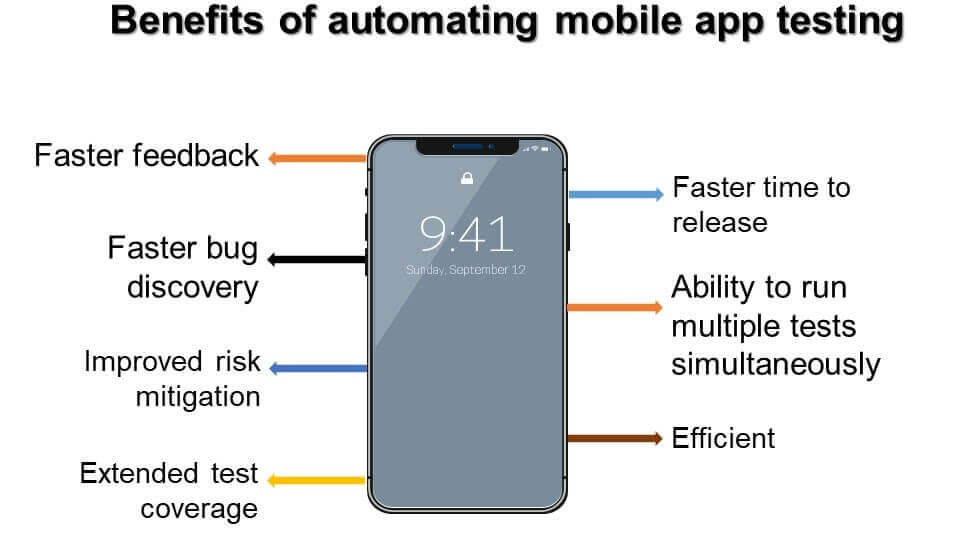Automating Mobile App Testing

Automating Mobile App Testing
Mobile phone users worldwide are increasing due to the availability of a variety of smartphones in the market, affordable data plans, improved connectivity, and a large range of apps for all types of usage. As per Statista, the number of smartphone users is expected to reach 7.5 billion worldwide by 2026.

These days, there are apps for almost everything, payments, shopping, news reading, education, medicine, work, social media, and gaming, and the list keeps growing. However, the popularity of an app is directly proportional to the number of downloads and its reviews, consequently, marking its market share. Users are demanding and any lag in the user experience, services, performance, and less friendly UI results in poor ratings. So, it is wise to invest time, effort, and resources to properly test your apps before launching.
Mobile app testing is a process to test the functionality, performance, user-friendliness, and security of an app.
Mobile app testing also includes testing for operational issues like interruptions due to change in service providers (or location changes), memory leaks, low resources, certifications, compatibility, installation issues, etc. Mobile app testing can be either manual and/or automated.
Benefits of automating mobile app testing
As mentioned in the previous section, your market share can take a major hit if your app is not robust and user-friendly. Therefore, it needs to be tested rigorously before it can be launched in the market. However, app testing comes with a cost attached to it. Since apps need to be tested for a variety of mobile devices and different OS, and with upgrades happening frequently, the possibilities are numerous and the cost to test all combinations grows beyond the original estimate.
To address this, it is strategically wise to automate your testing process to improve efficiency and save precious resources. Mobile app test automation is known to be a complex activity, but it would be good to invest initially and reap long-term benefits. You can read more about managing QA costs in our previous blog “Managing QA cost by adopting intelligent test automation”.

- Faster feedback
One of the biggest advantages of automation is that you get to know the test results almost immediately and resolutions for issues can be done on a priority basis.
- Faster bug discovery
Defect discovery time is significantly reduced as compared to manual testing.
- Improved risk mitigation
Faster and earlier detection of issues aids in quick resolutions and risks of running into problems at the time of launch are reduced by a greater degree.
- Extended test coverage
There is as much that you can cover in manual testing. With frequent releases and upgrades, it takes extra effort to manually test every little change. Test automation saves time and effort and provides better test coverage.
- Faster time to release
Test automation is a winner when it comes to saving those precious man-hours before the app is launched in the market. You need not worry about getting into the details of executing every test by yourself. Let automation take over and you can focus on other details to further make app release faster and better for your customers. Read This Blog: Benefits of automating mobile app testing
Comment / Reply From
You May Also Like
Popular Posts
Newsletter
Subscribe to our mailing list to get the new updates!
Categories
- Places and Regions (349)
- Health & Science (3559)
- Jobs (188)
- Work Life (286)
- Opinions (426)
- Real estate & Properties (121)
- Shipping & Logistics (64)
- Sex & Relationships (1755)
- Movies & Animation (6102)
- Comedy (229)
- Travel and Events (427)
- Gaming (1185)
- History and Facts (1296)
- People and Nations (1020)
- Science and Technology (3704)
- Arts & Entertainment (1810)
- Life Style (3627)
- Education (3386)
- Economics and Trade (1950)
- Others (5396)
- News and Politics (3218)
- Cars and Vehicles (430)
- Pets and Animals (326)
- Digital Marketing & Web Develpment (4)
- Robotics, VR & AR (0)
- DFTUntoldStories (1)
- Celebrities (83)
- Mobile Solutions & Apps (0)
- Ecommerce & Clean Tech (0)
- Artificial Inteligence & IoT (0)
- Big Data & Cyber Security (0)
- Business (1780)
- Palscity Show (0)
- Sports Show (0)
- Politics & Leadership Show (0)
- Digitally Fit Show (0)
- Entertainment & Lifestyle Show (0)
- Business Show (1)
- In The Morning Show (0)
- DFT Reels & Shorts (0)
- Natural & Food (1141)
- People and Culture (11)
- Sports (1906)
- Fashion (116)
- Gossip (55)
- Music (116)


